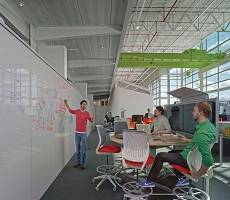July 24, 2014
Global executives value work-life balance benefits of connected workplace
 Senior global executives are working more hours and in more locations now ever, but advances in workplace connectivity mean they are far more satisfied with their work-life balance. According to the 2014 BlueSteps Work-Life Balance Report, by the Association of Executive Search Consultants (AESC), over half (52%) are satisfied or very satisfied with their work-life balance. In comparison, four years ago, 55 per cent did not believe their current work-life balance was satisfactory. Global executives work an average of 58.5 hours per week, with 39 per cent working over 60 hours per week; but the majority (81%) of those polled consider work-life balance when deciding on whether or not to accept a new position.Over one quarter (28%) rate their work-life ratio as more important than their potential earnings and 31 per cent would refuse a promotion or new job offer if it negatively affected their preferred work-life balance ratio. (more…)
Senior global executives are working more hours and in more locations now ever, but advances in workplace connectivity mean they are far more satisfied with their work-life balance. According to the 2014 BlueSteps Work-Life Balance Report, by the Association of Executive Search Consultants (AESC), over half (52%) are satisfied or very satisfied with their work-life balance. In comparison, four years ago, 55 per cent did not believe their current work-life balance was satisfactory. Global executives work an average of 58.5 hours per week, with 39 per cent working over 60 hours per week; but the majority (81%) of those polled consider work-life balance when deciding on whether or not to accept a new position.Over one quarter (28%) rate their work-life ratio as more important than their potential earnings and 31 per cent would refuse a promotion or new job offer if it negatively affected their preferred work-life balance ratio. (more…)





 The world of work and the workplace is always changing. We know it. You know it. In fact, there are a whole host of people that know it, but depending on what side of the professional fence you sit on, you might approach it in different ways, looking through a different lens or with a specific focus. Or are you already bridging the professional gap? Workplace change and the numerous ramifications of it are well documented. In a world that is changing, at frightening pace, it is strange to think that many of the ways in which we work are so entrenched in 20th century thinking. We need to break away from this and outline what the future is going to look like and how we should adapt. Or do we already have the answers? This ground is well trodden. However, it could be time to reassess our thinking and the way we approach this challenge, ensuring it becomes the norm for organisations around the world.
The world of work and the workplace is always changing. We know it. You know it. In fact, there are a whole host of people that know it, but depending on what side of the professional fence you sit on, you might approach it in different ways, looking through a different lens or with a specific focus. Or are you already bridging the professional gap? Workplace change and the numerous ramifications of it are well documented. In a world that is changing, at frightening pace, it is strange to think that many of the ways in which we work are so entrenched in 20th century thinking. We need to break away from this and outline what the future is going to look like and how we should adapt. Or do we already have the answers? This ground is well trodden. However, it could be time to reassess our thinking and the way we approach this challenge, ensuring it becomes the norm for organisations around the world.
 The recent Cabinet reshuffle in the UK Government won’t alter one fact; politicians simply don’t get it when it comes to technology, the workplace, the way people work and the needs of small businesses. Once you dismiss the paranoid idea that they DO get it but don’t care because they’re too busy looking out for The Man, you have to conclude that one of the big problems they have (this won’t go where you think) is that they don’t understand anything about technology and work, especially when it comes to emerging technology, the working lives of individuals, the needs and functions of small businesses and the fact the self-employed exist at all. These things exist outside the bubble. This is obviously a problem because they are implementing policies and making big, uninformed and anachronistic decisions about the things that shape every aspect of our lives, help to define us as people and determine how companies and individuals function. Here are just three examples.
The recent Cabinet reshuffle in the UK Government won’t alter one fact; politicians simply don’t get it when it comes to technology, the workplace, the way people work and the needs of small businesses. Once you dismiss the paranoid idea that they DO get it but don’t care because they’re too busy looking out for The Man, you have to conclude that one of the big problems they have (this won’t go where you think) is that they don’t understand anything about technology and work, especially when it comes to emerging technology, the working lives of individuals, the needs and functions of small businesses and the fact the self-employed exist at all. These things exist outside the bubble. This is obviously a problem because they are implementing policies and making big, uninformed and anachronistic decisions about the things that shape every aspect of our lives, help to define us as people and determine how companies and individuals function. Here are just three examples.
 In the latest copy of the Workplace Insight newsletter available to view
In the latest copy of the Workplace Insight newsletter available to view 












August 18, 2014
The CIPD is right to focus on the multi-generational workplace
by Justin Miller • Comment, Workplace, Workplace design
(more…)